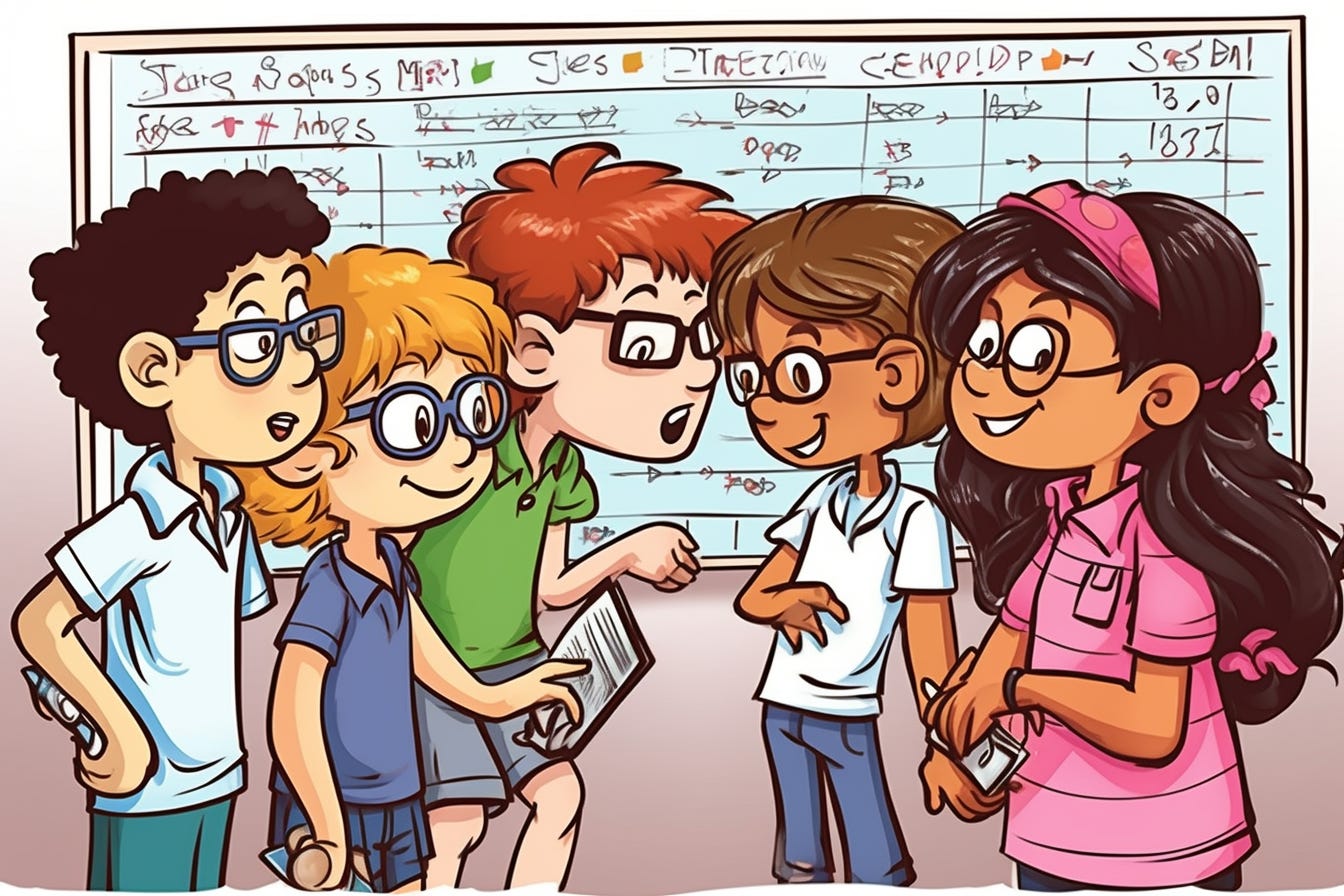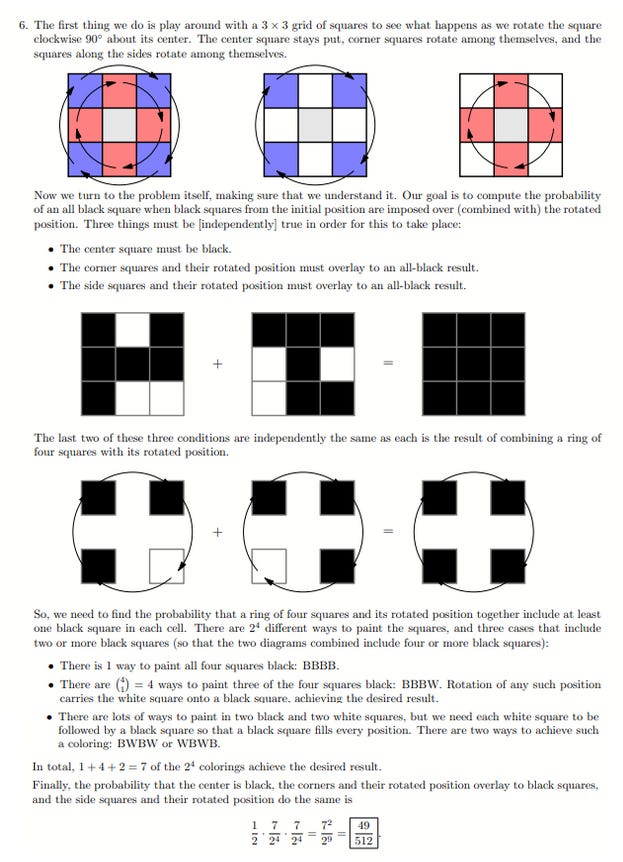Other Education Wars articles can be found here.
Recently, I've researched and written a bit less because I am starting to work more on two projects. One of those is the education company (MetaPrep) that I started building in late 2019, just prior to the Plandemonium. Liam Sturgess and I set up a MetaPrep Locals community that will serve as a portal and distributor of Educational programs and materials. Please join us there.
https://metaprepeducation.locals.com/
What will Those Programs and Materials Look Like?
I'm honestly not certain, yet. For 16 or so years since leaving high school, I've run math programs at various levels. I certainly have ideas about what early classes might look like. But what I'd like to do is open the process up for creative mixing. In order to do that, I'm making MetaPrep a sort of node in what I suspect will gradually 'round the Earth as part of a network. This model will not seek passive income from copyrighted, gated curriculum, and approved instructors. The model will simply be, "What people will offer in the MetaPrep Locals community in the form of paid subscriptions, course fees to pay for some classes (for those interested) and other programs." Maybe one day we'll still wrap up some of the curriculum into books—some people like a nice binding. But that won't be due to copyright.
This is much like the model people call Software as a Service (Saas).
Children playing, alone or in groups, with their own goals, learning happily and without constraints designed by interest groups and ideologists.
Note: I currently plan to keep a copyright symbol on some documents. This is to keep others from ever misrepresenting what work is mine or ours. Otherwise, my plan is to make even the source documents (often typeset in LaTeX, which is used for math and science publication) available for all.
While we will start with math programs, one problem that I would like to solve is that there is a great deal of pollution in educational programs from misleading statements about science to unnecessary politics and ideology inserted into…everything. Of course, what we consider appropriate or accurate might not be the same as what anyone else does, but the materials will be there for others to rework and craft. And if other people or organizations formulate better courses, more power to them.
I also plan to reach out to some of the excellent teachers I've met and talked to over the past three years. Some of these nurses, doctors, scientists, technologists, academics, scientists, and other thinkers are highly capable of teaching either full courses or specific classes with great care and clarity. We will invite others in, record it, ask if they will make their materials open source, and then share it all with the world.
A First Set of Programs: Counting/Combinatorics, Probability, and Statistics
Around 14 years ago, my wife was in a Biochemistry PhD program, and decided to take a serious graduate level Calculus-based Statistics course. The problem was that her last calculus class was a decade earlier, and prior to that some of her teachers were not good enough to give her the sort of foundation that would last. While she wanted to master that which separates the wheat from the chaff in the Sciences, she found herself in over her head very quickly. So, we started to work on problems at my school in the evenings, three hours a night, three days a week.
The material that we started with was the same material that I used with middle school students. We started there after working backward from the first class problem set.
"So, you don't remember how to take this derivative. Do you recall how to take the derivative of a polynomial?"
"Do you remember the Binomial Expansion Theorem?"
"Do you know what I mean when I say 'combination' or '7 choose 4'?"
"How do we correct for overcounting?"
Through Socratic questioning, I saw the weaknesses in the foundation, and helped her rebuild them from the ground floor. That took around six weeks, at which point she was acing her problem sets and tests without any more help from me. For most people, that might take longer, but she had one-on-one instruction through it all, and worked on a lot of additional problems.
Now she is a Bioinformatics instructor at a research university, and handles most of the informatics in her lab.
What material did we work on?
For the bulk of the 60ish hours we worked together, we worked on the same materials that I worked on with 6th through 10th graders. The harder problems on that end force students to creatively utilize their base skill set.
And whether or not a student can solve every problem, it is valuable for them to see what an instructor's organized solution looks like.
So, that's the material I plan to start with (starting with the most basic PreAlgebra counting problems, not the problem above that is designed to challenge advanced high schoolers), some of which was the same material that I was working on with Antonio (YouTube deleted our classes/discussions, sigh), who is welcome to join us again if he likes. The first class I'll start with is the one from my interview with Iris (also deleted by YouTube, sigh). I may want a one-on-one volunteer again for that one. This time we'll make sure all those videos find their way online, and stay there (that happened to be the single only video on the YouTube channel that was saved nowhere else, so you if you have a copy, please send it to me).
Early on, those invited to the classes (adults or children) will be those who are paid subscribers to our Locals community. At some point, we will charge for classes after the number attending grows too large to truly work with everyone.
We will at some point add a forum to the MetaPrep website where problem discussions can take place.








Sounds great but it sounds more like a math team type development program. As you know I have been doing ACT / SAT Math/Science prep tutoring for over 20 years and the interesting thing I see is that the schools, at least in our area, teach the basic tools of Algebra and Geometry but there is very little evidence of teaching problem solving. In my 3 or 4 one hour sessions with a student I work on problem solving skills - which start with READING the problem and detecting the significance of certain words in the problem itself. Once students start READING the problem, doing the math is not hard. One fact is obvious - the longer the problem description is the more likely students are to give up quickly and not even try. I get them to keep their focus on WHAT ARE THEY ASKING? The problem can be something very basic like:
John is going on a trip and he has been talking to a car rental company and the company explains that for his trip they have two options - Car A gets 22 miles per gallon and costs $50/day to rent and costs $0.25/mile driven. Car B gets 34 miles per gallon and costs $60/day to rent and $0.20/mile driven. John's trip from his home in Houston, TX to Denver, Co will take 2 days and cover 1,500 miles. How much will John save if he chooses the lowest cost option assuming that the cost of gas is the $3.00/gallon for both cars?
The math is basic arithmetic but the test writers add all the extra words to get students lost in the words rather than focusing on the math. So, I suggest that a part of the coursework focus on reading long problems and how to screen out extra information that does not help with the problem.:)
I tell the students that in 3 or 4 hours I can't reteach what they have covered in school over the past 6 or 7 years but if I can help them learn to THINK, then they can figure out any problem the ACT will throw at them and it works. The analogy I use to help people understand what schools are doing is this: Assume you took a mechanics course to learn how to rebuild your car engine and the teacher spent weeks going over each and every tool in the tool box. They show videos on how the tools are made and who has what patent on it. They include a few interviews with the people who invented the tools. They give tests making sure you remembered the %chrome and % iron in each tool and how much stress it can handle and all these kinds of details. THEN, for your final exam they roll in an old car and say - Now rebuild the engine. Not one single thing has been taught about USING the tools or how to use the tools to rebuild the engine or how an engine works. They just focused on teaching the tools. That is what I see from the math students I work with every day.
Mathew, you also know I have done a lot with science - specifically I developed over 30 hands-on science classes for working with elementary school students that focused on combining several levels of hands-on problem solving within the science that all students love. In 25 years of teaching 200 - 300+ students a year my classes we never had even one student that was not interested. All students participated. If your program would be interested in me working with you on that just let me know.
Any other aspects that you come up with that I can help with, let me know. I have all of my math videos on my YouTube channel for AllPencilsDown and I will be developing more but those are specifically about ACT/SAT math.
I like it. I am a math grad (Berkeley, 1966) and former math teacher, home schooling my Ukrainian/American kids in Kyiv. My oldest is using the standard 6th grade Ukrainian textbook. What's to like? It is free on line. There is no indoctrination - "rainforest math". Interesting questions, viz "A departing guest hands the bellhop four unmarked keys to the four doors of his suite. What is the maximum number of tries it takes to figure out which key goes with which door?"
https://pidruchnyk.com.ua/514-matematika-ster-6-klas.html
Learning is a question of the attitudes of students and society. Here they are serious. Moreover, there is no built-in bias against boys. I think Ukraine would be receptive to your approach.